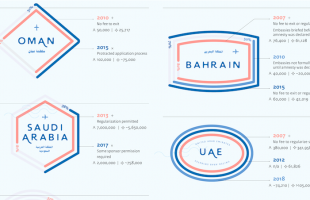What’s changed in Qatar since the ILO dropped its case?
At the halfway point of the technical cooperation between Qatar and the ILO, we take stock of the progress on promises made – or lack thereof.
At the halfway point of the technical cooperation between Qatar and the ILO, we take stock of the progress on promises made – or lack thereof.
The International Labour Organisation (ILO) dropped its case against Qatar nearly two years ago, following an agreement to a three-year technical cooperation and pledges for further reform. We are now at the mid-point of this cooperation. While Qatar has made some progress on its promises for reform, the advertisement of reform often outsizes the actual changes made, and considerable work remains ahead. This brief reviews key pledges made, changes to legislation, and on-ground realities since the case was dropped.
Migrant workers’ ability to change employers.
As part of its overhaul of the Kafala system in 2016, Qatar announced it dropped the requirement that workers obtain permission from their current employers to change jobs. However, executive regulations for the new immigration law have not been issued yet, and permission from employers – in the form of a No-objection certificate (NOC) – is decided on a case-by-case basis. The general rules are as follows:
- NOCs are required for employment transfer between government entities and from government entities.
- NOCs are required if employment is transferred during a fixed-term contract.
- NOCs are required if employment is transferred before 5 years of an indefinite contract.
- Domestic workers require a NOC to transfer employment. Domestic workers will usually require a NOC within a period of 2 years of the termination of their previous employment and cancellation of their residence permit.
- Where a fixed-term contract is terminated (and a residence permit is cancelled) and the employee leaves Qatar he or she may not return on a new work permit without a NOC until what would have been the end of the fixed term.
- Where an indefinite term contract is terminated (and a residence permit is cancelled) and the employee leaves Qatar, he or she may return the next day on a new work permit; no NOC is required.
Restrictions on migrant workers’ ability to exit the country subsequent to a reasonable notice period will be removed.
Migrant workers, except for domestic workers and other workers not covered by the labour law, no longer require an exit visa to leave the country. However, companies can obtain approval to reserve the right to require permission to exit from up to 5% of its employees.
(Edited to add): Employees of ministries, public sector organisations, and semi- or quasi-governmental organisations are also required to obtain an exit permit, thereby excluding a large number of workers, including those in oil and gas companies.
The Wage Protection System (WPS) will continue to be improved to ensure that workers’ wages are paid on time and that wage arrears are systematically settled. In addition, the Government of Qatar has announced its intention to introduce a minimum wage rate applicable to all workers without any distinction.
A temporary minimum wage of QR750 (roughly USD200) has been established for migrant workers.
The WPS still suffers from grave blindspots, with hundreds of workers continuing to be stranded after months of non-payments. As MR's reporting and the recent spate of protests in the country indicate, the WPS has not managed to stem gross violations of non-payment. The complaints procedure remains obscure difficult to access for most lower-income migrant workers.
In October 2018, the Workers’ Support and Insurance Fund was announced, but it has not yet been implemented. According to the law, 60% of the fees collected for work permits will go towards the annual budget of the fund. The fund is supposed to be used primarily for providing ‘support and insurance’ to workers and paying the settlements decided by the labour disputes committee (to be subsequently reclaimed from the employer).
National complaints mechanisms will ensure speedy and fair treatment and absence of retaliation.
Qatar’s Labour Disputes Settlement Committee became operational in March 2018. The Committee was supposed fast-track labour disputes and issue settlements within three weeks of a complaint being filed. In practice, while individual cases may be expedited, redressal in cases involving several workers from the same company remains slow; resolving these kind of labour disputes are especially inefficient because neither class actions nor unions are permitted.
Amnesty International points out the committee's weaknesses. “In many cases, workers have given up hope and returned home without the money owed to them. Even when cases are won, however, some workers still find it very difficult to receive their money, not least when companies cannot or will not pay the amounts ordered.”
Promotion of workers’ voices.
While the establishment of enterprise-level Joint Committees comprised of employer and worker representatives has begun, these committees are not a substitute for freedom of association and forming unions, which would vest more power with workers.
Residence permits will be renewed by migrant workers, instead of their sponsors.
There have been no announcements on this pledged reform. Residence permits can still only be renewed by sponsors, though it is workers who are liable for its expiration; if a sponsor fails to renew a residence permit, the worker becomes irregular at no fault of their own. The power of sponsors to determine workers legal status is a key vulnerability of the Kafala system.
In addition to these reforms, Qatar put into force a new law and standard contract for domestic workers. Serious protection gaps still exist, and enforcement mechanisms are weak.




